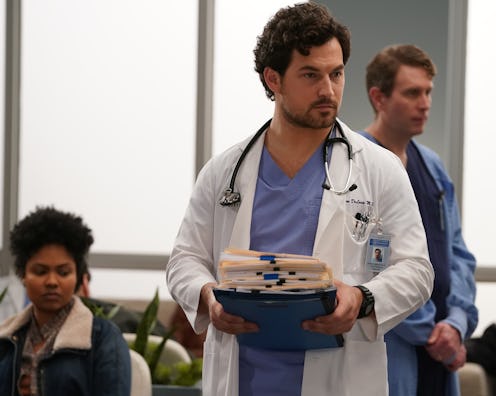Entertainment
Why Meredith & Carina Have Every Reason To Be Stressed About DeLuca On 'Grey's Anatomy'

You might have assumed that the title of last week's episode, "A Diagnosis," referred to Grey Sloan patient Suzanne, whose mystery illness was finally solved. And it did… but it also referred to her doctor, since Meredith and Carina are now convinced that Grey's Anatomy's Andrew DeLuca is suffering from bipolar disorder. But is Meredith's boyfriend (well, ex-boyfriend now) actually mentally unstable? Or are they just reading things into his behavior, knowing his family history, and seeing something that isn't there?
The question will continue in this week's episode, "Snowblind," which will find Seattle frozen in the grip of a record-breaking blizzard. The press release for the episode teases that, "Meredith and Carina question DeLuca's uncharacteristic behavior when he volunteers to perform a life-threatening task during a blizzard." The promo for the Station 19 crossover (yes, another one) shows that this dangerous mission involves walking across town in subzero temperatures to fetch a life-saving liver for a patient. "People are freezing to death," a concerned Meredith warns her ex. The promo ends with the cliffhanger that nobody has heard from Dr. DeLuca as Meredith looks on worriedly.
Is Andrew going to die? While it's been quite a long time since Grey's had a good old-fashioned dramatic character death, it seems unlikely that the writers would go that route while they're already dealing with the messy departure of Alex Karev (and his portrayer, Justin Chambers). And bumping off DeLuca just so Mer can hook up with McWidow seems like overkill. But even if Andrew does pull through, his actions still continue to raise concerns over his mental state.
To be fair, Meredith and Carina have a right to be concerned. Carina's and Andrew's father also suffered from bipolar disorder, as viewers learned last season. Andrew opened up to Meredith about his father's troubled past, and then the audience met the man himself when he arrived at Grey Sloan Memorial Hospital with his baby lambs in bags.
Although Andrew had a good relationship with Vincenzo when he was a young boy, he didn't grow up around his father; after his parents divorced, he moved to the States with his mother while Carina stayed in Italy with their father. Vincenzo notoriously operated on seven patients in a row without food or sleep during a manic episode, killing four of them, and got away with it thanks to his connections in the corrupt Italian legal system.
According to Carina, Vincenzo's mental health problems started when he was about the same age as Andrew is now, and manifested in a lot of the same ways: depressive lows (like how Andrew wouldn't get off the couch after his girlfriend Sam had to flee to Switzerland), manic highs (like his sleepless state while caring for Suzanne), and rash decisions (like going to prison for Meredith or trekking through a blizzard). Are these signs that Andrew has indeed inherited his father's illness? Or is Carina simply paranoid, and seeing a pattern where one doesn't exist?
If it turns out that Andrew is bipolar, it wouldn't be the first time Grey's has used an illness to retroactively explain a character's actions. After Izzie spent a season hallucinating (and having sex with) the ghost of her dead fiancé Denny, the writers explained this bizarre turn of events by giving Izzie cancer that had metastasized to her brain and caused the hallucinations. In Season 14, Amelia was suddenly diagnosed with (and just as quickly cured of) a brain tumor, which was used to explain away much of her previous erratic behavior.
It's possible that the writers didn't know when they had sad Andrew playing guitar on Meredith's couch in Season 14 or falsely confessing to Meredith's insurance fraud in Season 15 that these were symptoms of mental illness, rather than the typical sudsy plot twists of a primetime soap. Deciding to attribute those actions to a mental illness later on may be a bit of a "retcon" — but it dovetails nicely with Andrew's family history and provides the sort of high-stakes drama that Season 16 (and the character of Dr. DeLuca) has been lacking.
Whether this turn of events ends up bringing Andrew and Meredith closer again after their breakup, or permanently driving them apart, it should be exciting to watch things unfold. If Andrew is experiencing the onset of mental illness, and not just a series of bad decisions, hopefully he gets the help he needs… and doesn't end up unstable and disgraced like his father.